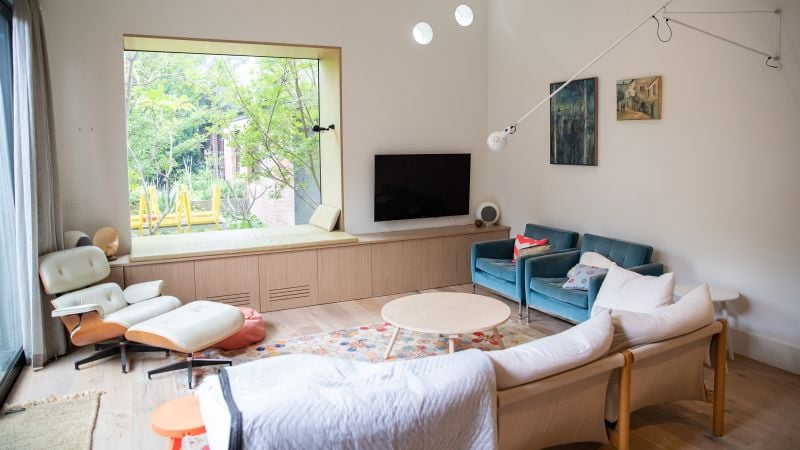…
Compared to other countries, America is known for bigger cars, portions and take-out coffee cup sizes. For most of recent history, Americans have also wanted bigger homes — but now that’s changing.
For most of the last half-century, new single-family homes kept growing. In 1973, the median size of completed single-family homes was 1,525 square feet, according to US Census data. By 2015, that number had ballooned to 2,467 square feet.
But as the cost of buying a home has exploded and McMansions have fallen out of favor, homebuilders have reversed course, building smaller homes with an eye to first-time buyers. In 2023, the median single-family home built was 2,233 square feet, down 9% from the 2015 peak, with many formal dining rooms and “bonus” rooms disappearing.
Carias and her partner ultimately settled on a roughly 920-square-foot home. To maximize space, they decided to use the basement as their primary bedroom.



This just means you’ll pay the same price for a smaller house.
Source: am australian
“why sell 1 regular house on an acre when you can sell 10 tiny houses on the same acre?”
real estate investor
If they did that, they just might alleviate the massive supply shortage we ran into. That would actually be great.
They are doing that. It’s really common to see a single family home with a decent but not big lot become 8 townhouses with no lot in big cities. Each townhouse costs roughly what the SFH cost the developers to buy.
Its more housing, but not at a pace that is fixing the issue, and you can argue the home buyers are getting way less out of it than they used to.
Building like that on those lots is often against zoning code. About 3/4 of all residential lots in the US are zoned for single family homes only, and though this is changing, you’re correct that it’s not fast enough. I’d be happy to get less than what my parents bought, when I’m ready to buy. As empty nesters now, they’ve easily got 4 times as much house as they actually need or use, and my mom in particular refuses to move. Friends of mine bought a place at the market rock bottom back in about 2012, and with no kids themselves, they also have far too much house, but that’s what was available.
These are in a major metropolitan area in the US and are fully legal where they are built.
They are modern, and in the case of new builds even include warranties for the first couple of years, but otherwise are pretty ass backwards on the “$/sqft” scale.
Its still denser housing in a place that needs it badly, but the price gouging is irritating to see.
I didn’t mean to imply that denser housing was being built illegally, only that the availability of it is a product of zoning codes forbidding it in most places. I don’t expect dollars per square foot to scale linearly in either case, and in my personal experience, when I ran the numbers about 7 years ago, moving from suburbia to a dense city ended up costing me almost exactly the same, because I no longer need a car here. You think differently about how much space you actually need when your social space is no longer a back yard or a living room and is instead a park or a nearby bar or something.
At least they’re getting better walkability out of the deal, and the local government won’t go bankrupt trying to maintain infrastructure serving them like the ones full of 1-acre lots will.
Here’s a rare example from San Antonio TX. These are small 600 sq ft homes, each with their won driveway, backyard, front yard with no shared walls with your neighbor. Priced at $135k.
If I were renting a one or two bedroom apartment, I’d much rather buy one of these instead.
That’s awesome. I live in an apartment that’s only a smidge more than 600 sqft, so that’s a good size for one person or a couple.
Yes, but they need to spread propaganda that the top 10% are not bleeding the rest if us dry.
It takes less resources and money to keep a smaller house. Smaller repair bills, smaller utility bills and smaller amounts of maintenance. Smaller, more sustainable housing should require people to work less to afford to live.
Or it means, people get in way more debt than they can afford to buy a small low quality house, that costs more than a comparable apartment and doesn’t offer any of the benefits of a proper house.
We have those developments here in Germany and it’s awful. It looks like shit and I’m 80% sure that a significant part of the current owners could only afford their houses due to the low interest rates of the last decade. If they have to inevitably refinance, someone loses their job or a large unexpected expense happens, they’re absolutely fucked.
Welcome to German suburbs. Where the space between houses is the absolute minimum, the houses are only slightly larger than a reasonable apartment and every house looks exactly the same like in the 20 other new development areas around the city.
It’s the plastic version of the discount dream of wealth.